
|
Tips of the Weeks - currently in the order they were put on the site
Trailer check - spring is a good time of year to get your trailer checked out . Give your trailer a yearly once over and make sure everything is working and in good condition. This includes the hitch, safety chains, breakaway system ( including battery) and coupler. Brakes should have regular maintenance, check to make sure all lights work, floor boards are in good shape along with the mats. Make sure there are no sharp edges or wasp nests inside, ties are in good shape along with all latches, partitions and the ramp if you have one. Good time to check tires - see tip below. Also make sure your hay nets are tied high enough so a horse doesn't get a foot caught. A good yearly cleaning inside and out is also highly recommended.Then enjoy your trailering trips knowing you have a nice safe trailer to haul your precious cargo.
Wasps - be sure and check your trailer for wasp nests. Make sure you check the inside, door handle and any other places you can think they may make a nest. Also a good idea to check inside of campers, stalls and under saddles. No fun being stung and definitely no fun for our horses. For an active nest, wasp spray works well ( can rinse area after spray has taken effect to get rid of any residue). Keep checking on a regular basis too, the nests can form quickly. Also don't forget to keep on eye out for Black widows - they love to hide too!
Trailer Tires - spring is a great time of year to check your trailer tires. Make sure the tread is Ok, they are not cracked, no defects, not too old ( trailer tires last about 6 yrs - no matter how much tread is left), make sure they are properly inflated, you should also get them balanced - gives your horse a better ride. Also make sure you have the proper type of trailer tire on your trailer. Also check your towing vehicle tires while you are at it. I have heard so many stories recently of blow outs with truck and trailer tires and the thousands of dollars of damage that has been done to the truck and trailer. Also I recommend getting the warranty on new tires - I have found it very helpful and has saved me money in the long run. Happy trailering!
Oleander Plants - These plants are very very toxic to horses ( and most other animals). Just eating1-2 leaves can result in death. Normally not a plant a horse would typical eat but if leaves get mixed in with other yard clippings and a horse roots through a leaf could be ingested. It is very difficult to counter the effects of the toxins. Please be aware of this to avoid a possible tragedy. After moving into my home I pulled mine all out, it just wasn't worth the risk for me.
Preventing Ticks - Winter and spring seem to be the worst time for ticks, at least in No Calif. Tick fever can also be a complication with horses ( dogs can also get tick fever). To try and prevent ticks, spray your horse with a spray that says it is for ticks ( some of the less expensive fly sprays say they are also for ticks and seem to work well against the ticks). I like to spray before and after a ride. If not riding much or at all, spray every few days or once a week. There are also other products you can look into to help prevent ticks, just something to be very aware of throughout the riding season. With that said - Happy trails!
Trailer Aid - This is a great item to have in all trailers (horse, travel trailers, 5th wheels) in case you get a flat tire. So much easier to use than trying to jack up your trailer to change a tire. Can be found in most horse catalogs, online or RV stores.
Check your tack - spring is a good time of year to thoroughly go over all your tack and make sure it is in good working order. Check billets on your saddle - both sides, stirrup leathers, bridle pieces - all connecting parts, including reins. Good time to clean and condition all leather too. A good conditioner makes a huge difference. Happy trails knowing your tack is in good shape and clean!
Rinse those boots - don't forget to rinse or clean your boots off after being at the barn. The horses urine etc can eat away at your boots. Make your boots last longer and do a quick cleaning!
One way to try and get more water in your horse during the winter - My goal is to make sure my horses drink enough water to keep them hydrated and hopefully prevent colic. I have put feeder/water buckets up on their stall walls and feed 1/2 - 1lb of grass hay pellets in lots of water. When cold I add warm water. They seem to love it and it is always all gone. I also add table salt to their dry "supplements" as another way to try and encourage drinking.
West Nile Virus - keep that water clean : West Nile is very much a concern. You can help reduce the risk by keeping your water troughs clean. It only takes 7-10 days for the larva to hatch. Options are - dump and clean tank every few days - I bleach when tank is green and rinse well. Other options are items you can buy at local feed stores to put in your water that are safe for horses. It is also a very good idea to make sure your horse has been vaccinated, not a 100% prevention but vaccinated horses fair much better if they contract West Nile.
Keeping All In One moist - I store in a rubbermaid type garbage can with a lid that fits tightly - but I do find in summer it becomes rock hard All in One, so I soak a hand towel size rag in water, rung most of the water out and placed over the All in One in the garbage can. Repeat as necessary. Works great - All in One is once again moist.
Bees, bees and more bees - Many riders are experience ground bees when riding on the trail. Please be aware, they seem to be on many of the trails. A few tips : stay on the trail - less likely to disturb the nests, ride in small groups - easier to escape than if in a large group, have a plan - ie: if a rider yells bees everyone knows to continue forward and get out of the area as fast as you safely can, keep moving forward - DO NOT turn around or dismount.
Keep your horses water cooler on hot days - freeze water in milk jugs or something similar and add to your horses water trough. This will help keep their water cooler and may also provide some entertainment for your horses.
RV tip - Not a real "horsey" tip but since many of us have RV's we use with and without our horses I thought I would add this tip. Try looking at Bed Bath and Beyond in July and August for some useful RV items. It is off to college time and I have found they have several items that might very useful for use in an RV. Don't forget to use their coupons - can use multiple coupons at one time and they never expire even though they have an expiration date on them. Happy shopping!
Emergency Barn Information - For each horse I have printed up a sheet with his/her picture, description and any information that someone else might need if I am unable to feed/care for them for any reason. For any horses on daily medication also note that along with where it is kept ( I keep a small amount in the barn). Save all info in a file on your computer and then it is easy to change at any time. I put each sheet in a plastic cover and tack up in a noticeable place in my barn. I also have a sheet on other barn items that might need to be done.
Stall/urine management - A few of years ago I tried a newer product - ABM ( Advanced Bedding Management) and have to say it really helps absorb the urine and takes away the smell. I have discovered that putting down some rice hills first then a bag of ABM works even better. I have one stall that my 3 horses love to pee in and that stall can get very bad but with this mixture it is very manageable.
Salt - I offer salt year round to my horses. For several years now I have been adding table salt - about 1-2 Tablespoons per day added to their "grain". This ensures they are getting some salt. I also offer the plain white salt blocks, my horses prefer the smaller ones but each horse I am sure has his or her preference. Still looking for the perfect salt block holder. Thought I had found it but my horses tend to break the screws off, so I am still on the hunt. Will post when I find it.
Check your horses ears and bellies for fly/bug bites. I personally treat by using a natural product with teatree oil as one of the ingredients. I rub a very small amount inside their ears where the scabs form and a more concentrated amount on their bellies. Helps with softening scabs, healing and keeping the flies/bugs away. I check and treat if necessary every few days all the way through the fall months.
Rattlesnakes - Be aware of your surroundings as you ride down the trail, be careful with your dogs too, a bite can be deadly for a dog. Enjoy the spring flowers and green grass as you ride but be extra watchful for rattlesnakes.
Cold weather tips relating to drinking water - If you unable to heat your water - If you have a muck bucket or something similar in the stall, bank it with shavings, that seems to help some with freezing. Water will still freeze just not as quickly. Also don't forget to use a clean manure fork or something similar to get the ice out of the water toughs - sure beats freezing your hands off. Move your water trough to a sunny area - moving your trough to a sunny location during the day helps quite a bit to warm the water.
Thoughts on preventing colic- feed more roughage including hay and beet pulp - not more grain or pellets, make sure they move - either ride them, taken them for a walk or turn them out in enough space to self exercise, provide ample fresh water - maybe warm it up. So many colic's this time of year - hopes this helps!
Cleaning your horses fly masks - I find if I Velcro them closed and put them in my washer ( I think best without an agitator but both kinds work), put them through the wash cycle and hang to dry, they come out great and are ready wear or store until next year. I wash mine throughout the season - every 2-3 weeks. I wash them at night, pull out in the am and put them on the horses still damp. I am sure it feels good to them in the heat of the summer.
Pigeon Fever and feed - One of the things to be aware of is horses with pigeon fever may tend to burn more calories and hence may need some extra feed. So keep an eye on your horses weight during a bout with pigeon fever. (This information was verified with a vet.)
Cleaning your horse trailer - spring is a good time of year to wash and clean the outside and inside of your trailer. Pull the mats out and check the floor. This should be done at least once a year. As I was cleaning mine I discovered that the area between the wheel well and the trailer - where they connect, holds a lot of dirt, hay etc. Squirt the water down in there and you will be amazed at all the stuff that comes out. Added bonus - always nice to have a clean trailer, although we all know they don't stay that way for long.
A place to hang that fly mask - If you are anything like me I never know where to put the fly masks when I take them off at night. They usually get tossed in a bucket, on the hay etc. I recently added another wooden folding saddle rack ( under $10 in most catalogs) and hung it up fairly high and it works out so well to slide the fly masks into it. Rack can then also be used for saddle pads, a saddle or whatever else you can think of and stored in the down position when not in use. Have one for my saddle at a lower level and love the flexibility of it .
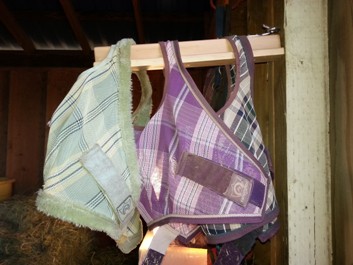
Rack in down position
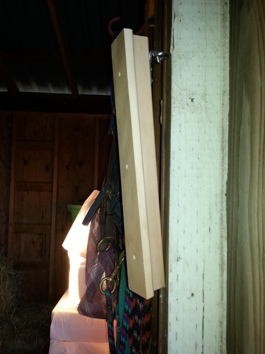
Make feeding easier - at least I find this approach easier when it comes to feeding especially in the winter and getting dark earlier. I like to get my grain/supplements and sometimes my hay also ready the meal or 2 before. I put my grain supplements in a 10 lb bucket my psyllium comes in - horse's name on each bucket. If I have time and room I will also measure out the next feeding of hay. This way when I come to feed I can just feed and not have my horses breathing down my neck as I prepare their food. While they are eating I work on the next feeding in peace. I found a routine that works well for me, hopefully you will also find one that works well for you.
Thrush! Something we have all had to deal with at one time or another. I have tried all the remedies and use several of them on a regular basis but if you have a really bad case of thrush, try this - ToMorrow (cephapirin benzathine) - Dry Cow, found at most feed stores. Comes in a small tube, cost is around $4. Squirt it in the affected area once or twice and the thrush should be gone. It really works well.
Itchy spots on your horse? - here's something that works well - Desitin. This comes from a friend (Peggy) whosaid she had tried just about everything for those spots - mane, tail etc that some of her horses were rubbing hairless and Desitin seems to work better than anything else she had tried previously. Inexpensive, easy and well worth a try!
Poison Oak and how to possibly avoid getting it. Since it is so easy to encounter Poison Oak on most of our trails where I live, this may be a tip worth trying the next time you venture out. This tip came to me years ago from a friend and seems to work very well for me. Try the Hyland's Poison Ivy/Oak pills sold at most health stores and some grocery stores. I dissolve 2 under my tongue BEFORE I venture out to where there will be poison oak and if I manage to hit a lot of it I take 2 more when I get home along with a shower using Tecnu scrub. This has really reduced my episodes of poison oak and made for very minor reactions if any at all. As my husband says I just need to look at poison oak to get it - so true!
Vinegar as a spot cleaner for your carpet. Not a "horsey" tip but one that was passed onto me from my sister in law and it works great and much safer than commercial cleaners for our indoor animals and not to mention us. Most of us with horses have cats and/or dogs. I use a wet or damp rag and pour a little white vinegar on the rag and start working on that spot. Spots seem to come out easily every time (I would pre test on a hidden area of your carpet first just to make sure it doesn't harm your carpet). An inexpensive easy solution to a problem most of us have have.
Mold on your leather tack? Try rubbing straight Listerine on the moldy areas and then wipe off. Tack should now be mold free (tip by Peggy).
Smoke in the air from fires, please be aware of the smoke and breathing difficulties our horses could have in addition to us. Best to ride when the smoke has died down some ( currently later afternoon) or ride in an area that is smoke free.
Insulators for electric fencing - there are several types out there but the ones I love and use are the Pinlock Offset Insulators by Gallagher. They can be hard to find but a store that carries Gallagher usually can order them. They are approx 11 inches long so it keeps the hot wire well off your fencing and as a result I just put up one strand about 1/2 way up. Another huge plus is they don't need to be put on every post, you can skip several posts - just depends on the terrain and how long your fence line is. Can always add more if needed. They are very easy to stall too.
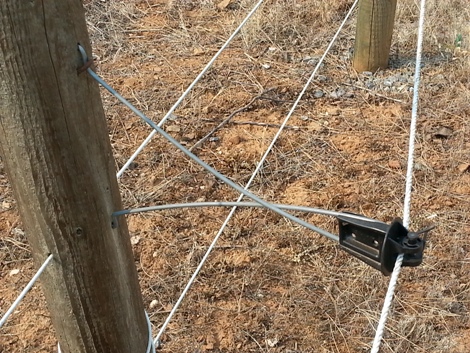 Picture of what the insulators look like. They come 25 to a pack. Picture of what the insulators look like. They come 25 to a pack.
Manure Forks - we all seem to use them and go through them on a regular basis. After years of buying the same brand and/or buying replacement ends I finally found a brand that seems to last me for several years - Foxwise. I do have a tine broken off each end - one just happened but overall it does seem to be so much more durable than the others I have tried. It is a metal handle vs a wooden, the fork section looks like the others but just seems to last so much longer. I think mine is approx 4-5 years old and still works great.
Heat Advisory for Horses

Spraying off your horse can be effective at lowering body temperature. This Friday, Saturday and Sunday (June 7-9) will produce record hot temperatures throughout northern California. Many horse events are scheduled during this time. Here are ten important tips to prevent heat related problems in horses.
1. Heat can kill: High environmental temperatures and related heat issues of dehydration, exhaustion, and heat stroke can occur in horses and can produce illness and death. This is serious business and you must take steps to ensure your horse is protected when traveling in a trailer, being ridden on trail rides, or in competition events.
2. Drink water: Maintain hydration in your horse by allowing free access to water at all times during hot weather. It is a myth that a hot horse drinking water will experience colic or other medical problems. Never let your horse pass up a chance to drink water. Only horses that have been deprived of water for a significant time (many hours or days) need to have water provided in smaller amounts over time. Let your horse drink on the trail or after a class at a show. Hint- You can lead a horse to water . . . . this is true, so offer some hay and your horse will often drink after eating the hay. Soup-consistency bran or pellet mashes are another means of getting extra water into your horse
3. Shade: Provide shade as much as possible.
4. Limit what you do with your horse during peak heat:
- Ride or compete with your horse in the early mornings when it is cooler.
- Have the ride or event management consider a change in the program schedule to limit afternoon activities during peak heat.
- Shorten your ride.
- Go slower and provide frequent breaks for your horse, in shade.
- Encourage your horse to drink whenever they want water.
5. Ventilation: Provide open vents and windows in trailers which can open for cross ventilation (however, don't let your horse stick its head out while on the road).
6. Know signs of fatigue and overheating in your horse and stop before more severe signs of heat exhaustion begin: Persistent high respiratory rate that does not come down with rest over 10-30 minutes (normal is 20-40 breaths per min). Change in mentation, decreased energy level and reluctance to keep going. Dry mucous membranes in the mouth (they should feel “slimy”). Prolonged capillary refill time—Push on your horse’s gum. They should be pink to start, then it will blanch to white after pressure, and return to pink in approximately one second. Check this at the start of your day and frequently throughout the day. If it is prolonged, your horse is trying to tell you to stop, rest, provide water and if other signs of colic or muscle pain occur, you need to stay put and seek veterinary attention. Gut sounds—Listen at the start of your day (if you don't have a stethoscope put your ear on your horse’s flank- behind the ribs). You should hear gurgling sounds on both sides of the belly– that is normal and good. Quiet gut sounds are a warning that your horse may be heading for dehydration or exhaustion.
7. Fans: If in a barn with limited ventilation, try to arrange more air circulation by careful placement of a fan in front of the stall or in the aisle way. Keep electric cords out of reach of horses.
8. Hose (spray) off your horse or pour water from a bucket over your horse. Cool water is fine, normal temperature (not hot) water is good too. Evaporation produces cooling and continuous hosing is one of the most effective means of lowering body temperature.
9. Water source: Keep a supply of water available for your horse to drink. Obtain some clean 5 gallon cans and fill them up with water before you travel.
10. Electrolytes: These may be useful if the horse has been sweating excessively. Only use if they can be followed by access to water to drink. Have a plan outlined by your veterinarian if you have not used electrolytes before. Only use electrolytes specifically made for horses.
Trailering Tips in the Heat
If you need to trailer your horse, do so in the cool early morning or late evening hours when it is cooler. Don’t leave your horse in a parked trailer, especially if there is no shade. Just as with a parked car, temperatures inside a trailer can rapidly reach 140 degrees and the horse can quickly develop heat stroke.Provide as much ventilation and airflow as safely as possible on the road.Be very careful with hauling foals – they appear to be even more susceptible to heat than adult horses.
Tips provided by: John Madigan, DVM, Diplomate ACVIM, ACAW*, Gary Magdesian, DVM, Diplomate ACVIM, ACVECC**,W. David Wilson, BVMS, MS, MRCVS***,*International Animal Welfare Training Institute,**Head- Equine Critical Care- VMTH,***Director- Veterinary Medical Teaching Hospital (VMTH),School of Veterinary Medicine University of California-Davis
Cost of one "grain" vs another - Just because one 50 lb bag is cheaper than another doesn't necessarily mean it is cheaper to feed. You may need to feed more of it then you would need to feed of a more expensive "grain". So compare more than just the cost, compare the quantity that needs to be fed. Make sure what you feeding is doing what you want it to do, otherwise you could be wasting your money. We all have to decide what is the best feed for our horse(s) in their particular situations - just choose wisely and look at all aspects of a "grain".
Misters at your barn - these are great for the warmer days, especially the extremely hot days. There are kits you can buy or make your own - all available at any home improvement store. We chose to make our own, used pvc pipe up the inside of the barn, through the eves and ran it under the eves running the length of the barn. Have a mister nozzle in front of each stall door and over the water trough. I then attach a short hose from my water source to the pvc pipe in the barn. Pictures to follow. My horses love the misters and they don't use much water.
Tar pitch or sap in your horse's mane, tail or elsewhere - try mayonnaise. Rub in effected area and it should help in getting all that sticky stuff out (hint from a friend, Kathy).
Move drinking water to a cool place during the warmer months - horses love cool fresh drinking water. So take a look at where your water troughs are and consider moving them to a shadier spot if not already in one. Also a great idea to clean the troughs on a regular basis so your horse(s) has fresh clean water at all times. I keep a large trough outside under the eves of my barn where it only gets some am sun and then also a muck bucket in each stall 1/2 full (easier to dump and clean). And yes, I have to tie my muck buckets in place as I have one horse who loves to play with them. Muck buckets are inexpensive and easy to clean - mine tend to last for 2-3 years, sometimes longer. My horses tend to drink more out of the lighter colors - who knows why, maybe they can see the water better but their favorite is the large trough outside. My 3 horses can easily go thru 60-70 gallons every 24 hrs in the warmer months.
Check your trailer before pulling away - always a good idea to take that extra minute or two and recheck your trailer to make sure it is properly connected - hitch on all the way and secure, lights plugged in and working, safety chains secure, trailer battery connected, all doors are shut, ramp up if you have one and don't forget to remove any chocks. Not only do this when you first hook up but also coming back from a ride, just a good measure in case anyone has tampered with your trailer (yes, I have heard of that happening). Good idea to also check back doors and ramps even if just dropping off a horse - make sure all is closed back up .
Blanket Storage - One of the best ways I have found to store horse blankets is in a rectangular 30 gallon plastic garbage can. I can fit 3 large winter blankets in one. Lid fits snugly so no bugs get in. Just make sure blankets are completely dry before storing - Look for blanket information to be added soon - fitting, cleaning etc.
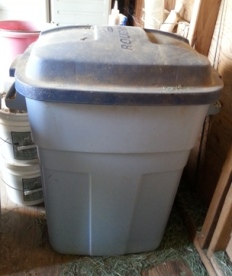 30 gallon Rubbermaid trash can - keeps dust and bugs out, stores 3 large winter blankets easily 30 gallon Rubbermaid trash can - keeps dust and bugs out, stores 3 large winter blankets easily
Wear gloves - For years my husband told me to wear gloves as I would come in with splinters of wood or hay and I finally took his advise and now I will not do much outdoors without my gloves on. What a difference gloves can make! I get the cheap leather work gloves ($3-$5) and insulated work gloves for winter ($10 -$15). I go through about 1-2 pairs a year, I replace when that first hole appears. Buy at local farm supply stores or large retail stores like Wal Mart, Target, Home Depot or Lowes.
Weigh your hay - This way you know exactly how much hay your horse(s) is eating and you may find you save money on hay costs since so many of us tend to over feed our horses. The easiest way I have found to weigh hay is using a baby scale. Just place the hay on top and weigh, it is that easy. You can pick them up used at used baby stores, garage sales etc. Once in the habit of weighing your hay it is hard to feed and not weigh hay. I have been using a baby scale for 20 yrs now and am currently on baby scale #2 - a scale can last you many many years.
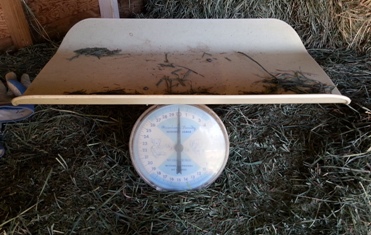 Baby scale works well to weigh hay, makes it very easy to do. Baby scale works well to weigh hay, makes it very easy to do.
Using a piece of baling twine, tie it in a loop to where ever you tie your horse - horse trailer, barn etc and tie your horse to the baling twine. That way if you do have a horse that pulls back the twine breaks fairly easily - horse, halter and whatever you have tied to are still in tact. Just a nice easy, cheap precaution even if you don't think you have a horse that might pull back - one never knows with horses.
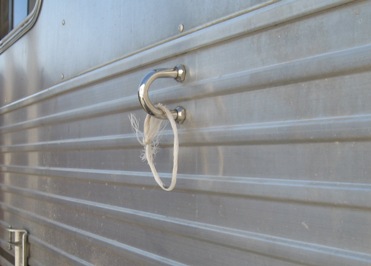 baling twine tied to a horse trailer where horses are tied. I also use twine on the trailer to hook my hay net through. baling twine tied to a horse trailer where horses are tied. I also use twine on the trailer to hook my hay net through.
Beet Pulp is a great source of fiber for your horse and also a great way to help keep your horse hydrated all year round. An easy way to soak your beet pulp is to soak it the feeding before, then it is ready to go at your next feeding. Make sure you add plenty of water for soaking - in winter I add some hot water I bring from the house just before feeding. Some horses are not crazy about beet pulp but many, not all, learn to like it over time.
Spray Pam or something similar on the bottoms of your horses feet to keep snow from packing in hooves. (suggested by Suzy)
Install a solar light in your barn area - Having no electricity to my barn I need some type of light and these solar "spot' lights are easy to install. They give out quite a bit of light for a short period of time. They are motion sensored so make sure you put them where the horses can not activate them. I have a shed row barn with my feed room at one end and have installed a solar light in the feed room. Works great and people always comment on it. Purchase at Lowes, Home Depot etc - sometimes hard to find but well worth the search. They run about $50 - $80.
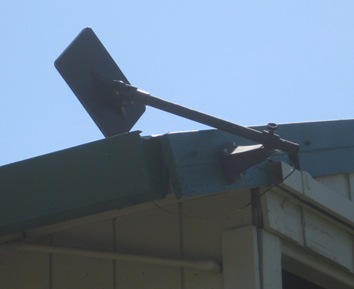 panel for solar light panel for solar light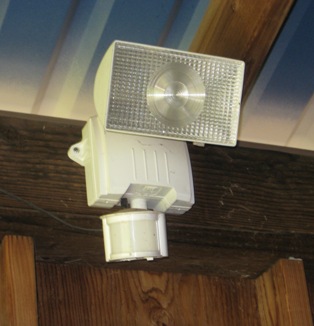 inside view inside view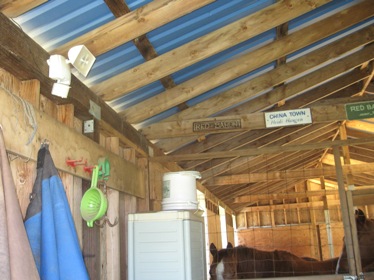 placement of solar light placement of solar light
The wire is run under the eves and then can connect to the light inside. My barn is open and the horses do not set off the light where it is located. Senor is turned more towards the outside door.
Use a clean manure fork to get the ice out of your water troughs - This tip was brought to me by my neighbor Sonya after years of breaking the ice and then grabbing the chunks out with my hands and ending up with frozen hands. This sounds like a much better solution.
Use vet wrap to wrap the handles of your wheel barrow, manure forks etc. This not only gives you a better grip but will help insulate from the cold especially on the items with metal handles. I have the wooden handles of my old wheel barrow wrapped and it is much easier to grip and no more splinters. I have wrapped the metal handle of my manure fork where I grip it and what a difference it makes in this cold weather, my hands stay so much warmer even wearing gloves. Doesn't take much vet wrap to do the trick! Replace vet wrap every few months.
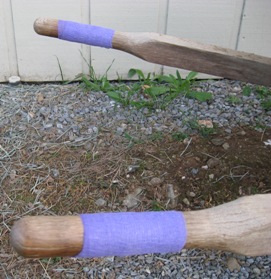 Wheelbarrow handles Wheelbarrow handles  Manure fork handle Manure fork handle
Polo wraps work great when used on arthritic joints, such as a knee on these cold winter nights. I would wrap my 30+ year old's knee very night when it was cold and what a huge difference it made on how well he was walking in the morning. If your horse is out in the rain make sure the wrap doesn't get soaked.
|
|
 |


